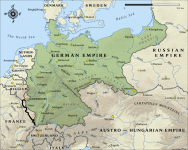The Germans are caught in a trap. On one hand, the steps they need to take steps to prevent a French recovery and eventual rematch; on the other, taking those steps will turn France into a permanently hostile nation and practically guarantee the French will seek a rematch when they have a chance. It will also make them seem much more powerful and threatening to the rest of Europe, leading to alliences forming against them. Even if ATLFrance isn't up to challenging the Germans on their own, the Russians might support them and/or Germany might get into a war with Russia later on and then have the French stab them in the back. There's also the very real problem of just what to do with the French population of the annexed regions, who cannot be expected to be loyal to the Reich.
Assuming they do, how badly will France be hampered? The French will certainly start to move industry south - perhaps even move it to the colonies. (The Germans don't have a strong navy yet.) They'd also have much more of a shock to the system, forcing more reform (or worse, a tilt towards something more fascistic; they might start blaming the former government for the defeat and purge them all). Given time, i think the French will rebuild ... but will they have the time? Or ... defeat in the war might lead to more challenges across the French Empire, if the French look weak.
I'm not sure where that would go, but it would be interesting from a historical POV.


